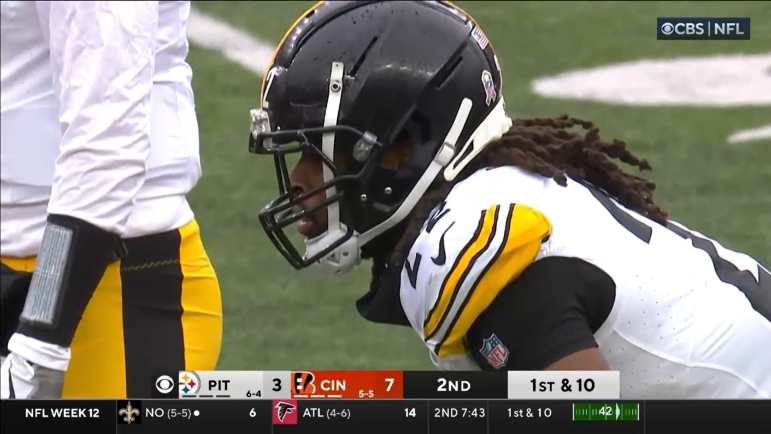Under the new CBA that reduced and slotted rookie deals, there’s one thing every draft pick is chasing. That second contract. That’s when players get paid good money. It’s especially true for running backs, one of the most devalued positions. In the NFL world, 28 or 29 is approaching the cliff. Turning 30 means falling off it. The sooner they get that second deal, the better. It’s why Najee Harris should be happy the Pittsburgh Steelers declined his fifth-year option.
Should he also be pissed? Of course. Declining the option says the team doesn’t think Harris is worth $6.79 million, a number that’d keep him outside the top-ten paid backs in football, for next season when that figure will be an even smaller percentage of the cap. It doesn’t feel good to be on the list of player declines, joining busts like Tennessee CB Caleb Farley, Arizona Cardinals LB Zaven Collins, and New Orleans Saints DE Payton Turner.
But there’s an upside. Harris is now a free agent after the 2024 season. This puts him a year closer to that second contract, something he’ll cash in on with a strong campaign. Pittsburgh can still wave the franchise tag over him, which is more than double the fifth-year option amount, but by declining this option, they’ve conceded some control to Harris over his future.
Harris’ path to the NFL was different than other running backs. Most leave school early, as soon as they’re eligible and have a decent draft grade, and come into the NFL at 21 or 22 years old. They know, to borrow Dave Bryan’s phrase, that meter is running. Harris played all four years at Alabama, waiting his turn behind Damien Harris, Josh Jacobs, and Bo Scarbrough. When the Steelers drafted him in April of 2021, he was already 23 years old. Today, he’s 26.
Had Pittsburgh picked up his option and refused to extend him, Najee Harris would’ve been under contract through the 2025 season. Meaning, he wouldn’t hit unrestricted free agency until the 2026 offseason. By then, he would’ve just turned 28 years old. In the NFL, that is ancient. The odds of a team offering a three-year deal are greatly reduced, and teams become much more wary of signing a player through his age-31 season. The backs paid this year, Saquon Barkley and Josh Jacobs, are 27 and 26 years old, respectively. Joe Mixon also received a long-term deal from the Houston Texans but at several million less per season. Ditto with Derrick Henry. Here’s the overall structure of each, sorted by average yearly value.
Running Back Contracts, 2024
Saquon Barkley (27 years old) – Three years, $37.75 million, $12.58 million average yearly value
Josh Jacobs (26 years old) – Four years, $48 million, $12 million average yearly value
Joe Mixon (28 years old in July) – Two-year, $19.75 million extension, $9.875 million average yearly value
Derrick Henry (30 years old) – Two-year, $16 million, $8 million average yearly value
With Mixon and Henry, there’s a clear drop in pay. Their past production is great, but teams pay running backs for future production. The closer to 30 you are, the less you’re worth, and it’s why Henry, among the most talented backs of this generation, is making less than Mixon and Jacobs.
For a comparatively older back like Najee Harris, who was worked heavily during his final two years at Alabama and someone who led the NFL in touches as a rookie with Pittsburgh, the sooner he lands that next deal, the better. The less wear and tear, the younger he is, the fewer “what-ifs” teams will have about him in the future. Harris has been remarkably durable, never missing an NFL game, but teams still have that concern. It’ll only grow over time. The option would’ve been the safer play for him, locking in that $6.79 million, but players bet big and bet on themselves. And there’s a payoff on the other side.
His option being declined might be the best thing for him. Go out, have a great season. Either the Steelers will dare to tag him, where Harris still has some leverage. Until he signs the tag, he can skip OTAs and training camp without being fined, something that couldn’t occur under the option. Or Harris can land a long-term deal ahead of 2025 and get paid what he’s worth, either from Pittsburgh or another team. And he’ll start making some good money relative to the hundreds of millions each team spends every season.
Harris has the right to be mad. He’s done everything possible to earn that fifth-year option. But he should treat the team’s decision as a reason to celebrate. It just got him one year closer to a big-time payday.








